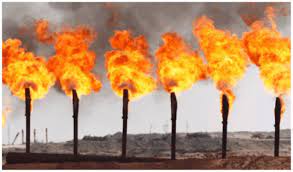Nigeria is home to one of the worst gas flaring situations in the whole world, burning out an estimated $2.29bn per annum based on data from the Nigerian Oil Spill Detection and Response Agency (NOSDRA).
NOSDRA estimated 4.2 billion standard cubic feet of gas flared in Nigeria estimated at more than $14.6 billion from 2012 to 2021. “This is in addition to $8.3 billion loss in penalty for the wastage totaling $22.9 billion loss within the same period” the data released in the first week of September 2023 suggested.
Worried by these huge economic losses that if harnessed, should have impacted the economy and hedged the naira against losing value like it is currently experiencing, Fluenta’s technology is seeking to aid Nigeria in reducing gas flaring significantly.
The $22.9bn loss to gas flaring can build standard gauge rail facilities from Lagos to Kano and from Lagos to Calabar plus all the necessary ancillary services. This money could also help revamp all the federal and state universities across the country and fully equip them with modern facilities.
The $22.9bn loss could also provide free education from primary to secondary school level to over one million vulnerable children across Nigeria.
Thus, fluenta’s team implemented a multitude of innovative, bespoke solutions, each considered on a case-by-case basis, to ensure accuracy of the system.
Fluenta, the global leader in ultrasonic sensing technology for measurement of flare gas, has completed work on the Dangote Refinery in Nigeria – Africa’s biggest oil refinery – to install 18 ultrasonic flare gas meters on large pipelines around the plant, Fluenta said in a statement.
Dangote Refinery, the world’s largest single-train refinery is capable of refining 650,000 barrels of oil per day — enough to meet Nigeria’s daily fuel supply requirements, with a daily surplus of 38m litres of refined products, already earmarked for export.
The statement said with Fluenta, “Nigeria is positioning itself as a world-leader when it comes to reducing its emissions, and flaring – the controlled burning or combustion of excess or waste gases that cannot be processed or captured for productive use – is a safety and environmental practice employed in the petroleum industry to prevent release of potentially harmful or combustible gases into the atmosphere.”
“Flare measurement in a refinery is essential, from a regulatory and environmental law compliance perspective, and for accurate emissions monitoring” Fluenta said.
Radek Kurkowski, director at Fluenta, says: “Flare gas measurement and control is vital to ensure compliance with environmental regulations and to help identify potential safety hazards. This is especially true at a plant on this never-before-seen scale and with the world’s largest flare pipe.
“Delivering this solution meant some close work with our local partner and the client project team, and we are delighted with the end result – which will support bringing energy security to Nigeria and the wider Africa region. Our team used a range of state-of-the-art technology, adapted meter software and special pipe gaskets and ball valves to deliver the pipe flare gas measurement solution.”
“Fluenta’s work stands as testament to the power of innovation, creative team work and a desire to always meet the client’s needs. We are extremely proud to support the domestic security of energy supply in Nigeria.”
He said Fluenta spent more than four months working with its exclusive Nigerian representative, Daptem Engineering, and the Dangote project team to deliver a workable, accurate and reliable flare measurement solution.
The team implemented a multitude of innovative, bespoke solutions, each considered on a case-by-case basis, to ensure accuracy of the system.
Under current Nigerian law, companies refining oil and gas must pay a ‘tax’ for flared gas, to encourage an overall reduction in flaring, underlining the importance of Fluenta’s accurate, trustworthy flare measurement and management.










